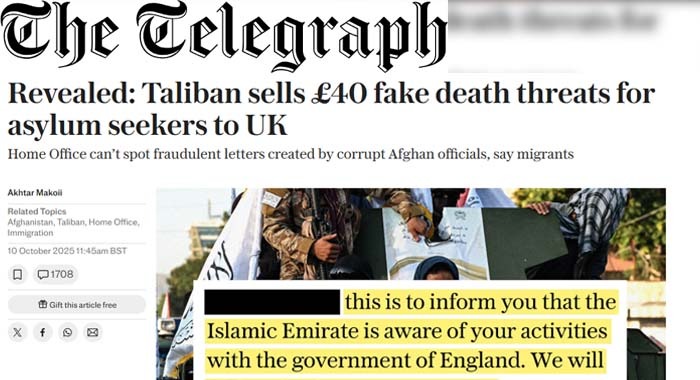A startling investigative report by the British newspaper The Telegraph has revealed that fake Taliban-issued threat letters are being sold across Europe for as little as £40, allegedly to help Afghan nationals secure asylum in Western countries.
According to the report, some corrupt Afghan officials including individuals with ties to the Taliban have been involved in issuing these counterfeit documents in exchange for money. These forged letters often bear official Taliban stamps and signatures, and are presented by asylum seekers as evidence of persecution, claiming their lives are at risk in Afghanistan.
In a sting operation conducted by The Telegraph, a reporter successfully obtained a forged letter for £40 (approximately 3,500 Afghan afghani). The letter included direct death threats, accusing the recipient of collaborating with the British government a charge designed to strengthen the asylum claim. Some letters even falsely assert that the Taliban are monitoring the individual’s social media activity.
Shockingly, many of these fraudulent documents mention the specific European country in which the asylum claim is being filed a detail that would not appear in an authentic Taliban communication. Premium versions of these forged letters are reportedly available for up to £200 (around 17,500 afghani), complete with higher-quality stamps and seals that make them more convincing to immigration authorities.
The scam, according to the report, has severely undermined the credibility of genuine asylum claims by Afghan nationals fleeing legitimate threats. In 2022 alone, over 100,000 Afghans applied for asylum in the United Kingdom, many of whom are now facing heightened scrutiny due to the rise in document fraud.
A Taliban official admitted to The Telegraph that some local members of the group are producing these counterfeit letters illegally. He warned that such acts are punishable, stating that anyone caught forging Taliban documents would face severe consequences.
Meanwhile, the European Union is actively seeking ways to return rejected Afghan asylum seekers. At least 20 EU member states have requested that the European Commission initiate direct communication with the Taliban government to facilitate deportations of those whose applications have been denied.
The growing trade in fake threat letters not only threatens the integrity of the asylum system but also casts a shadow over the plight of those who are genuinely at risk under Taliban rule. The situation underscores the urgent need for more robust verification systems and international cooperation to address both fraudulent and legitimate refugee claims.





